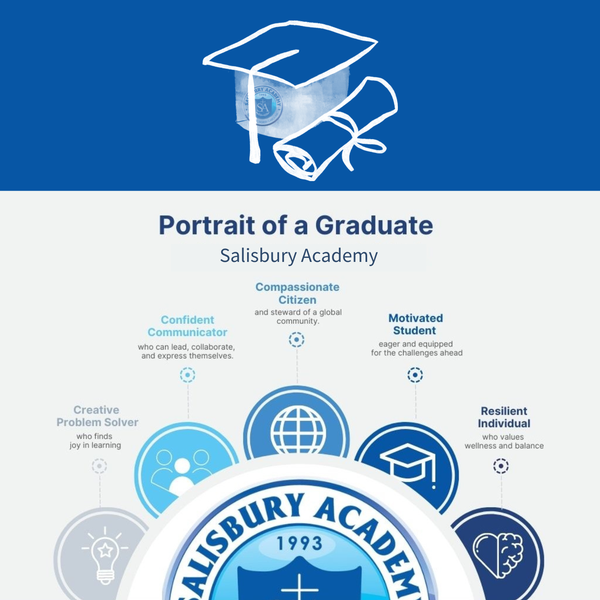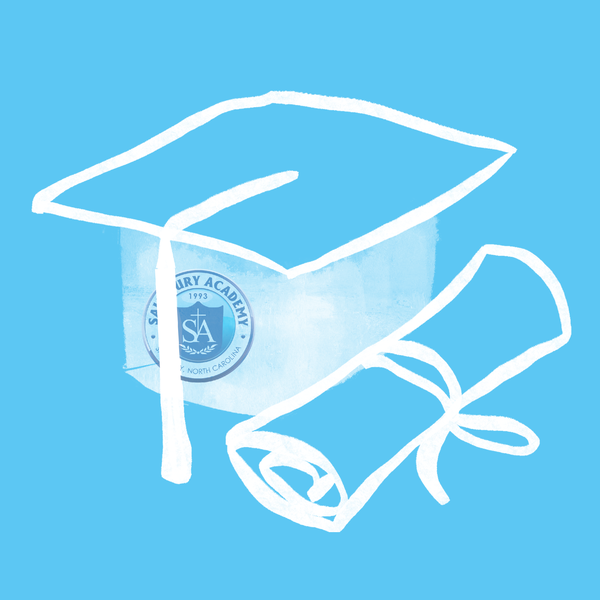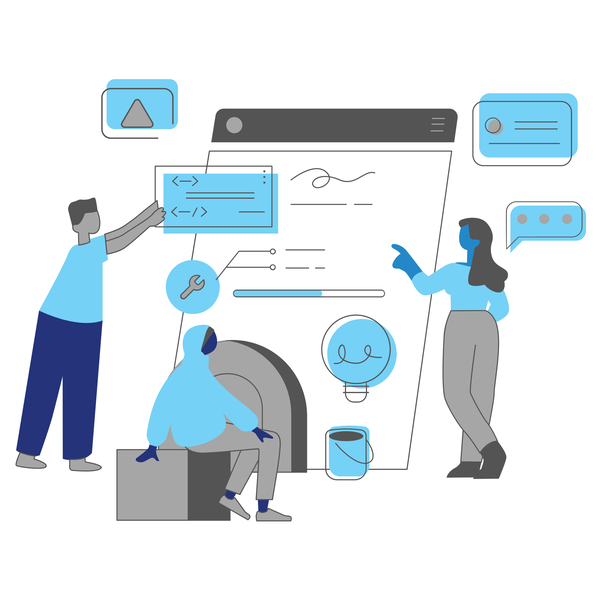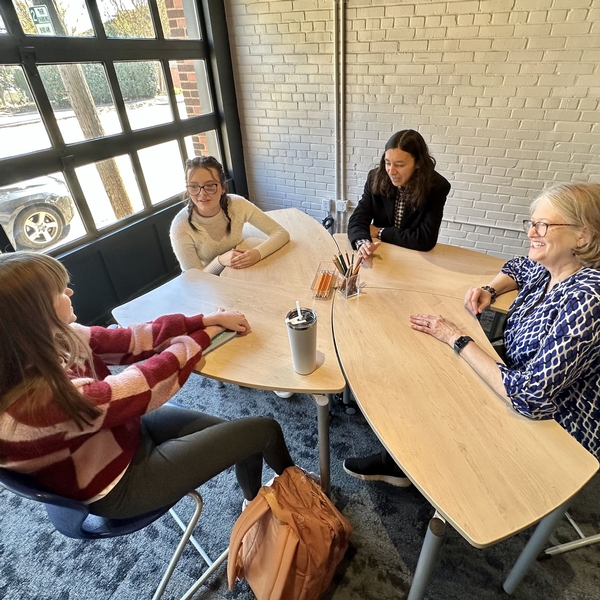The SA Graduate - One of Distinction

The Salisbury Academy Portrait of a Graduate was developed from extensive stakeholder engagement, research around best practices, and guidance of the SA core values and mission. It is a command of the Portrait’s five competencies that will distinguish Salisbury Academy graduates from many others in their journeys forward.
The Portrait does not identify the skills we expect students to exhibit for admission to Salisbury Academy. Nor does the Portrait suggest skills we hope students will accidentally discover as they mature in their teenage years.
Rather, the Portrait’s five key competencies are the skills our school is designed to directly nurture and develop in each student. As explained in a recent post, SA’s commitment to and accountability for the development of these competencies is equal to our passion for teaching content knowledge.
Our families choose an SA education because they too value these competencies and realize their important role in life-long success.
The core competencies in our graduate profile are not just the characteristics we like best. Rather, the competencies are research-based skills that will carry students to the highest level of success in their future endeavors. Here is just a sample of the research that supports each of the five SA graduate competencies:
SA graduates will be motivated students eager and equipped for the challenges ahead.
* A study by University of Pennsylvania psychologist Angela Duckworth indicates that perseverance and passion for long-term goals might be a more effective predictor of success than IQ.
SA graduates will be creative problem solvers who find joy in learning.
* A study by Adobe found that creative skills rank among the top three deciding factors to college admissions decision makers.
* According to another Adobe study, 82% of college-educated professionals say they wish they had had more exposure to creative thinking as students.
SA graduates will be confident communicators who can lead, collaborate, and express themselves.
The Association of American Colleges and Universities surveyed 400 employers who consistently ranked communication and collaboration skills as most important in their workplaces.
SA graduates will be compassionate citizens and stewards of a global community.
It has been shown that students engaged in community engagement or service learning achieve deeper knowledge of the discipline, problem-solving capacities, critical thinking, and abilities to understand complexity and ambiguity, but also greater personal and social growth.
SA graduates will be resilient individuals who value wellness and balance.
In his book Developing Resilience (2018), Neenan explains that inner resilience is a resource that appears to be both a significant tool for success in the world and the basis of good mental health.
The Making of the SA Graduate

Before Salisbury Academy decided to open an upper school, there was extensive work identifying the educational needs of our community and the desired outcomes of a 9-12 program. Part of this work involved stakeholders identifying the qualities/skills/abilities they would most like to “gift” their student upon high school graduation.
The resulting list held over 60 items with items like confidence, good communication skills, empathy, and independence topping the list. The list contained a wide range of outcomes, and there was one obvious commonality. - Every word on the list spoke to who the graduate would be, not what specific facts they would know.
Soft Skills Matter Most
The traditional school model focuses almost exclusively on hard skills measured by achievement tests. Yet our gut, just like the stakeholder’s list, tells us soft skills are exactly what our graduates need most. It turns out, our gut is right.
Kirabo Jackson at Northwestern University found that schools that intentionally build “soft” skills such as interpersonal skills, effort, and grit outperformed schools that only focused on the “hard” skills of test scores in both short-term and long-term results.
In the article Hard Facts on Soft Skills, the authors state:
“Achievement tests miss, or more accurately, do not adequately capture, soft skills—personality traits, goals, motivations, and preferences that are valued in the labor market, in school, and in many other domains…soft skills predict success in life, that they produce that success, and that programs that enhance soft skills have an important place in an effective portfolio of public policies.”
Who We Become
This realization was a turning point in our design process. This is when we knew the model we created must address the “who we are becoming” piece as directly as the “what information we are learning" piece. The result was our graduate profile and its five competencies:
.jpg)
Many schools and systems have graduate profiles stating what they hope their graduates will aspire to. But, don’t be fooled. The SA difference is that our entire approach to education is aligned with developing these core competencies in our students from day 1. Adding to the foundation of virtues and life skills taught in the 3K-8 program at Salisbury Academy, our model guarantees the development of these competencies because our processes are designed to support it.
The Difference is Pedagogy & Accountability
When students are engaged in authentic, real-world challenges as a part of their core curriculum, they have the opportunity to hone their soft skills as they work deeply with content matter. The SA Upper School will engage students deeply in this pedagogy known as problem or project based learning.
Additionally, in a traditional school students who may have worked on projects (be they authentic or otherwise) were graded solely on their final work product.
This approach overlooks the critical moments for feedback and development of the soft skills. The SA Upper School will use rubrics designed for articulating growth in the soft skills and allow for teacher, self, and peer assessment throughout a project’s duration.
The New Tech Network is an example of a high school model where students engage in problem based learning and experiential engagement on a daily basis. They have developed a series of rubrics that allow a student’s growth in the soft skills to be quantitatively measured. See an example for the skill of agency here.
The Buck Institute for Education also has a well-honed set of rubrics for the soft skills that support their project based learning approach. See an example of a creativity rubric here.
The SA Approach
At the SA Upper School, regular and authentic projects provide opportunities for rubric-guided feedback, and our Compass course will provide time for reflection. Students will maintain a portfolio that illustrates their growth in each competency for their senior portfolio defense.
In this way, our model stands accountable to our graduate profile as a statement of the outcomes we provide consistently to students, parents, and the community. They are outcomes that are not just aspirational but required for success in the life each graduate will experience beyond the classroom.
Real Work for the Real World

In a world of Google and Alexa, ChatGPT, and Instagram, our learners are awash in information. Yet we know that simply having access to information isn’t enough to complete the types of tasks presented in the “real world.”
Authentic work of the “real world” is far more complex than most typical school assignments like single-content worksheets or multiple choice assessments. Authentic work requires application of knowledge across multiple subject areas while employing skills like creativity, critical deduction, and persistence.
The boredom battle
The disconnect between the work students experience in school and the work they see in the “real world” is correlated to the staggering numbers of students reporting they are bored in school.
According to editors of Harvard Business Publishing: “Students are increasingly finding educational value from other resources and questioning the gap between what is taught in classrooms and what they need to learn to excel in the real world.”
The real deal
At the SA Upper School, we want to change students’ relationship with their work, to think and interact with content and their community in a meaningful, authentic way.
The SA downtown, place-based design immerses students in the community. Their schoolwork becomes solving real-world challenges, and students are accompanied by outstanding educators who help them learn and reflect deeply. In short, our students engage with their world not tomorrow, but NOW.
Benefits abound
The engagement from place-based education offers many student benefits beyond engagement including:
* Increased academic achievement
* Developing students’ ties to their community
* A heightened commitment to serving as active, contributing citizens
By doing real work as an integral part of their Upper School education, SA students are becoming the citizens the world needs for tomorrow.
Find examples of other place-based models and their documented successes here.
Experiential Learning and Complex Challenges

The SA Upper School values purposeful preparation for life after graduation. This blog is the fourth in a series highlighting the ways in which the SA Upper School’s design successfully launches students into their post-graduation plans.
SA Upper School’s downtown location allows students to make the community their classroom. In doing so, experiential instruction takes on a new depth as students solve real-world challenges.
Not only does this model equip students with the competencies outlined in our graduate profile, but it mimics the direction of the learning in many colleges and universities.
Explore the world to prepare for success in it
High Point University prides itself on connecting at least a quarter of each course's content to experiential applications. HPU explains the thinking behind this strategic design:
“Because professors want their students to stretch themselves, work in the community and find out firsthand what “real” means. Students then discover for themselves that experience brings real-world context to classroom content.”
SA Upper School seeks to achieve the same goals through partnerships with local businesses, nonprofits, government agencies, as well as art and entertainment organizations. Walking just outside the school doors in Downtown Salisbury, our students are immersed in community connections that help them determine how their passions connect to community needs.
Think and Do
When students connect with the community, their interest and passion for its needs and challenges increases. NC State University explains their method for connecting students to their passions through community challenges:
“At NC State University, we pair passion with purposeful action. And our students aren’t afraid to get their hands dirty tackling the major challenges that face our world. That’s why our motto is “Think and Do.” Here, you’ll go beyond the classroom to gain real experience — and you’ll graduate ready to take on whatever comes next.
SA Upper School core content classes will also dive deeply into real-world problem solving through our community connections. For example, 10th graders explore the role of legislation, scientific data, and community nonprofits in addressing concerns around storm water run-off. Freshman learners will consider the making of heroes and the stories that surround them not just in literature but in American history and our current community. By telling the story of unsung heroes in our community, our freshman learners will view the world from multiple perspectives and help our community do the same.
Explore these experiential models in other colleges and universities:
Clemson University - Experiential learning is how lessons come to life for Clemson students.
Davidson - Community-based learning courses focus on meeting a community-defined need by working alongside community members, site visits to organizations and exhibits, and guest speakers.
University of Tennessee - Learn through direct experience and intense reflection to increase your knowledge, acquire lifelong learning and problem-solving skills, and illuminate values.
Oberlin College - Their Center for Engaged Liberal Arts connects the classroom to the world
Finding Passion - Personalized Electives

The SA Upper School values purposeful preparation for life after graduation. This blog is the third in a series highlighting the many ways the SA upper school’s design successfully launches students into their post-graduation plans.
At the SA Upper School, students have the space and support to design their own electives in their junior and senior years. Most students will use this opportunity to create a year-long course that unites several of their interests. Full texts, primary sources, interviews, site visits, internships, and apprenticeships provide the content for these courses while mentorship by an SA staff person offers guidance. Traditionally, students will demonstrate their learning through a culminating project that shows the breadth and complexity of their work.
A Competitive Edge
The work students curate in their portfolios from these personalized courses give admissions officers, scholarship committees, and future employers an understanding of the students’ personal drive, depth of interest, as well as their academic and social agility.
Not only do personal electives give students a competitive edge in obtaining their future goals, but they prepare them to embrace personalized learning opportunities they may find with increasing prevalence in higher education.
Create Your Own Major
Many colleges and universities now offer students the opportunity to create their own major. Most of these programs are referred to as interdisciplinary, individualized, or "design your own majors.”
Emory University clearly embraces personalized courses and majors explaining: “Gone are the days of only traditional majors. Here, we foster creativity, curiosity, and the freedom that enables a vision for change. That’s why Emory students can create their own academic paths, combine seemingly unrelated studies, and hone in on how they can make the world better through their passions.”
Find additional examples of universities with design your own majors here:
Cornell University - individualized majors are all about you and your passions.
Johns Hopkins University - allows students to combine disciplines in Krieger School of Arts and Sciences to build toward a rich exploration of a clear set of principles or questions.
James Madison University - for students whose interests cross-cut traditional disciplinary boundaries and who are seeking control over their academic career.
University of Washington - allows highly motivated and self-directed students to pursue the questions about which they are most passionate.
Open Curriculum
Perhaps one of the most prominent examples of personalized academic exploration is provided by Brown University’s Open Curriculum model. Brown explains their approach this way:
“At Brown, our students develop a personalized course of study — they have greater freedom to study what they choose and the flexibility to discover what they love…as the architect of their own education, Brown students are responsible for their own intellectual and creative development.”
Brown’s Dean Rashid Zia states, “Our goal is a high one — that each and every one of our students is engaged, empowered and transformed by their education. What’s unique about Brown is that we elevate the role of students in achieving that goal as active participants in framing their own education.”
The personalized learning made possible through the Salisbury Academy Upper School distinguishes our model similarly to Brown. Personalized electives elevate the role of the student and, consequently, equipped our graduates for lifelong learning and lifelong success.
